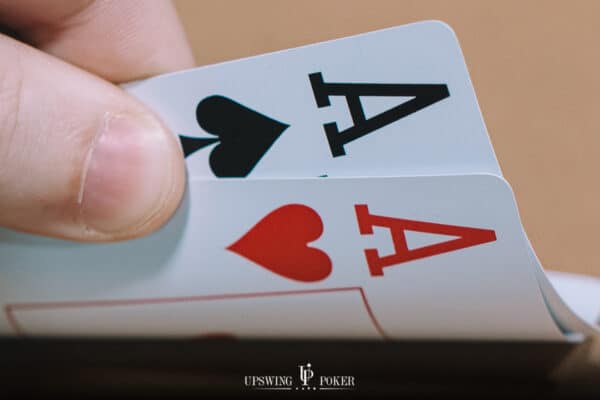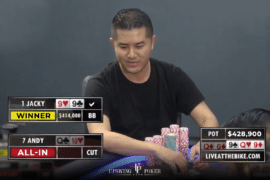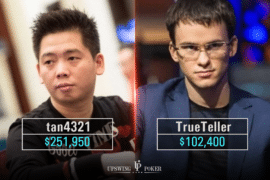
World’s Best Cash Game Player Sets the Trap with Pocket Aces ($95,600 Pot Analysis)
Let’s take a look into arguably the most competitive poker arena in the world: high stakes online cash.
The subject of this article is a $200/$400 hand played by BestDayEver (BDE) against arguably the best cash game player on the planet: Linus Loeliger.
The effective stack is roughly $65,000. Without any further ado, let’s dive into the action!
Preflop Action
BDE raises to $920 from the Button with . Linus 3-bets to $4,400 with from the Small Blind. BDE 4-bets to $11,200. Linus calls.
Preflop Analysis
BDE makes a good raise with Ace-Jack offsuit both in terms of hand selection and sizing. His Button raising strategy should consist of around the top 40-45% of starting hands, which Ace-Jack offsuit is comfortably part of.
Faced with this raise, Linus should be 3-betting with around the top 15% of all starting hands from the Small Blind. Needless to say, Pocket Aces are part of that range. Size-wise, anywhere from 4x to 4.5x seems to be the sweet spot according to preflop simulations. This size negates the original raiser’s positional advantage to a degree, blocking his ability to continue with a very wide range.
Facing the Small Blind’s 3-bet, BDE makes a good 4-bet. Against a strong and aggressive player like Linus, BDE should be 4-betting around 10% of the time with a somewhat linear range made out of:
- Pocket Jacks and better
- Ace-Ten offsuit through Ace-King (at varying frequencies)
- Some suited Aces, suited Queens, and other bluffs (low frequencies)
Size-wise, anywhere from 2.2x to 2.5x is good. That’s big enough to put pressure on the Small Blind’s range due to the pot odds offered and the positional disadvantage the Small Blind has to deal with.
Facing this 4-bet, Linus makes a good decision to just call with Pocket Aces. Calling Aces vs a 4-bet works extremely well because:
- There are no overcards that can hurt its value
- The stack-to-pot ratio (SPR) will be extremely low, making it harder for his opponent to realize equity
Note: Want to learn when it’s appropriate to slow-play Pocket Aces preflop? Check out this episode of the Upswing Poker Level-Up podcast.
3 Situations to Slow-Play Pocket Aces | Upswing Poker Level-Up
Flop Action
The flop comes . The pot is $22,800.
Linus checks. BDE bets $4,400. Linus check-raises to $10,000. BDE calls.
Flop Analysis
An action flop gives Linus top set and BDE top pair with a flush draw.
On this Ace-high monotone flop, BDE’s range has a big equity advantage. But he is getting demolished in terms of nut advantage (i.e. who has more flushes).
BDE has many more top pairs and strong underpairs (such as Pocket Tens through Pocket Kings) but Linus has many more flushes like , , and .
This type of range interaction, coupled with the low SPR, leads to a medium frequency, very small c-bet size from BDE. This strategy seeks to capitalize on the large amount of whiffs in Linus’ range, while minimizing the downside of getting hammered by the flushes with which Linus will check-raise.
BDE correctly identifies this dynamic and makes a 20% pot-sized bet. In theory, he could go even lower than that — a tiny 10% pot bet would have a similar effect for a cheaper price.
Against this c-bet size, Linus should look to play aggressively by check-raising with the majority of his flushes, some percentage of his pocket pairs with a flush draw, and some top pairs at low frequencies.
Check-raising with Aces is a fine play too, especially given that his sizing is (correctly) very small. The aim of this size (roughly 2.2x the bet) is to deny the equity of BDE’s airball hands while also putting medium top pairs and middle pairs without a diamond into a brutal situation.
BDE has an easy decision to call given that he has a flush draw to go with his top pair.
Turn Action
The turn comes the , making the board . The pot is $42,800.
Linus bets $10,400. BestDayEver calls.
Turn Analysis
The is a brick turn, in theory, but it gives Linus a full house. This card slightly favors BDE’s range due to Linus not hitting any set or completing the flush with the bluffs in his range.
Linus should be employing a mixed-frequency strategy with all of his range, meaning that he should bet at some frequency with all of his flushes, pocket pairs with a flush draw, and top pairs.
Having said this, betting Aces here is somewhat counter-productive. If he bets, underpairs without a flush draw will fold. These hands have a 5% chance of hitting a lower full house on the river and thus a 5% chance of getting stacked by Linus’ Aces should he check. That being said, this is a fairly small negative effect.
Against this bet, BDE has no better alternative than calling with his top pair and flush draw.
River Action
The river comes the , making the final board . The pot is $63,600.
Linus bets $16,000. BDE calls and gets the bad news as Linus scoops the massive $95,600 pot.
River Analysis
All draws miss, which means that the river is a total brick.
I think Linus should be checking with his Aces in order to win the maximum. Here’s why I think that is:
- He blocks the calling range (most of the calling range is made of hands)
- He unblocks the bluffing range (most of the bluffing range is made by , and hands)
- If he block bets, BDE is supposed to shove with some hands that are unnatural to see a human shoving with (such as Ace-King)
- If he checks and BDE has Ace-King, BDE is much more likely to shove himself than to raise all-in against the block-bet
Faced with this size, BDE has an easy call given that he blocks many the flushes, as well as strong top pairs.
What do you think of the play in this hand?
Do you like Linus’s plays? What about BDE? Let me know in the comments below.
That’s all for this article! I hope you enjoyed it and that you learned from it! As usual, if you have any questions or feedback feel free to leave a comment in the section down below.
If you want more hand analysis from high stakes cash games, scroll down to related articles below!
Till’ next time, good luck, grinders!








